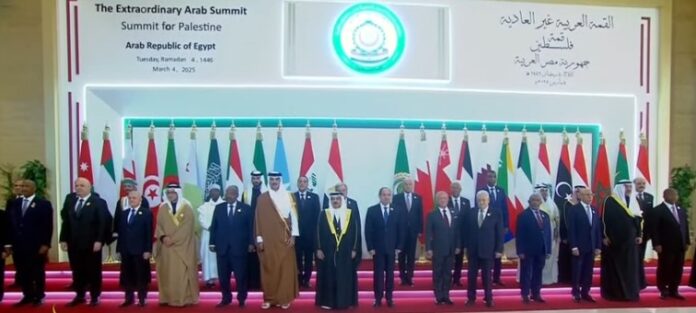Newsman: Arab foreign ministers met with U.S. Middle East envoy Steve Witkoff in Doha, Qatar on Wednesday to discuss Egypt’s Gaza reconstruction plan. The foreign ministers of Saudi Arabia, Qatar, the United Arab Emirates, Jordan and Egypt and U.S. Middle East envoy Steve Witkoff discussing Egypt’s Gaza reconstruction plan.
A statement issued after the meeting emphasized the ministers’ commitment to consolidating the ceasefire in Gaza alongside efforts to achieve a comprehensive peace based on a two-state solution. The talks also addressed mobilizing funding for Gaza’s reconstruction, particularly in light of Egypt’s planned international donor conference, organized in collaboration with the United Nations and the Palestinian government. Saudi outlets Al Arabiya and Al Hadath reported Hussein al-Sheikh, secretary-general of the PLO Executive Committee, also attended the meeting.
The participants agreed to continue consultations and coordination with the United States regarding the Egyptian initiative, which was formally adopted during the Arab Summit in Cairo on March 4.
The discussions also covered the establishment of an administrative committee to manage the Strip.
Meanwhile, Egypt and Qatar, along with the United States, continue their mediation efforts between Hamas and Israel.
Egyptian Foreign Minister Badr Abdel Aty separately met with his Qatari counterpart, Sheikh Mohammed bin Abdulrahman Al Thani, to discuss further steps toward implementing the reconstruction plan and strengthening the ceasefire.
Israel and the United States initially rejected the Egyptian reconstruction plan for Gaza, while the Hamas terrorist group welcomed the proposal.
The Israeli Foreign Ministry sharply criticized the statement issued at the Emergency Extraordinary Arab Summit, accusing it of ignoring the realities on the ground following Hamas’s brutal attack on Oct. 7, 2023.
“The statement remains rooted in outdated perspectives,” the ministry said, adding that it “fails to mention Hamas’s brutal terrorist attack, which resulted in thousands of Israeli deaths and hundreds of kidnappings.” Israel also condemned the summit for its failure to denounce Hamas explicitly.
The ministry also took aim at continued reliance on the Palestinian Authority and the United Nations Relief and Works Agency for Palestine Refugees in the Near East (UNRWA), organizations it accused of corruption, support for terrorism and failure to resolve the longstanding conflict.
“For 77 years, Arab states have used Palestinians as pawns against Israel, condemning them to eternal ‘refugee’ status,” the statement read.
Israel also referenced recent proposals that could offer Gazans a new future, including the idea promoted by Trump. “There is an opportunity for the Gazans to have free choice based on their free will. This should be encouraged!” the ministry stated. Instead, it accused Arab states of rejecting this opportunity outright while continuing to level “baseless accusations” against Israel.
The statement warned that Hamas’s actions have destabilized the region and that leaving the group in power would prevent any chance of lasting security. “For the sake of peace and stability, Hamas can’t be left in power,” the ministry said.
“We urge regional states to collaborate in creating a future of stability and security in the region,” the statement concluded.
The White House said that Cairo’s Gaza plan does not address the current harsh realities on the ground.
“The current proposal does not address the reality that Gaza is uninhabitable, and its residents cannot live there humanely when it is covered in rubble and unexploded bombs,” said Brian Hughes, spokesperson for the National Security Council.
Hughes also said,“President Trump stands behind his vision to rebuild Gaza without Hamas.” Despite the rejection of the plan, he emphasized that the United States remains open to “continuing talks” on the issue.
Cairo’s reconstruction initiative was proposed as an alternative to the plan put forward by U.S. President Donald Trump —an idea strongly opposed by Cairo, Amman and other regional powers.

